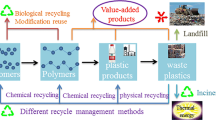Abstract
The main purpose of plastics recycling is to reduce the high rates of plastics pollution, and in the same time to reduce the need for raw materials (resins) needed to produce new parts. Sometimes, the above-mentioned goals are not attained for unpredicted reasons. During recycling process, and in special in the case of repeated (multiple) recycling, polymeric materials are subjected to a continuous process of degradation. It was found that, degradation and consequent the coloration of the molded parts from ABS is confined to the surface of the specimen and is controlled by the rate of oxygen diffusion through the polymer. In the case of molded parts obtained by multiple recycling, there is a significant difference between FTIR spectra of dark (colored) area samples and reference area samples, especially the peak absorbance value of the infrared spectra. Darkening, in the case of recycled ABS, is attributed to the butadiene degradation, pointed out by FTIR results. Within dark (colored) areas there were found deposits containing relatively high levels of carbon, oxygen, sodium, chlorine, potassium and trace amounts of other elements. The quality level of molded parts thus obtained is strongly affected by the presence of dark areas and mentioned deposits. This article presents some deficiencies encountered in recycling plastics and makes some suggestions for improving this process. Without analysis of the potential side effects of repeated recycling of plastics on the end user, the recycling of materials does not make sense because its main goal cannot be achieved.
















Similar content being viewed by others
Abbreviations
- ABS:
-
Acrylonitrile–butadiene–styrene, a common thermoplastic polymer
- PPAP:
-
Production part approval process, a standardized process in the automotive and aerospace industries
- PFMEA:
-
Process failure mode effects analysis, a structured analytical tool used by an organization, business unit, or cross-functional team to identify and evaluate the potential failures of a process
- LPA:
-
Layer process audits, a quality technique that focuses on observing and validating how products are made, rather than inspecting finished products
References
Andrady AL, Neal MA (2009) Applications and societal benefits of plastics. Phil Trans R Soc B 364:1977–1984. https://doi.org/10.1098/rstb.2008.0304
Arostegui A, Sarrionandia M, Aurrekoetxea J, Urrutibeascoa I (2006) Effect of dissolution-based recycling on the degradation and the mechanical properties of acrylonitrile—butadiene—styrene copolymer. Polym Degrad Stab 91:2768–2774. https://doi.org/10.1016/j.polymdegradstab.2006.03.019
Brennan LB, Isaac DH, Arnold JC (2002) Recycling of acrylonitrile–butadiene–styrene and high-impact polystyrene from waste computer equipment. J Appl Polym Sci 86(3):572–578. https://doi.org/10.1002/app.10833
Fei NC, Karamuddin S, Siddiquee AN, Khan ZA (2011) Experimental investigation on the recycled HDPE and optimization of injection moulding process parameters via Tagu. Int J Mech Mater Eng 6:1:81–91. www.researchgate.net/publication/215594743
García MGT, Schlatter M, Cabrera FM, Manzanares JT, Hanafi I (2016) Recycling of acrylonitrile–butadiene–styrene using injection moulding machine. Procedia Technol 22:399–406. https://doi.org/10.1016/j.protcy.2016.01.068
Grigore ME (2017) Methods of recycling, properties and applications of recycled thermoplastic polymers. Recycling 2:24. https://doi.org/10.3390/recycling2040024
Grigorescu RM, Grigore ME, Iancu L, Ghioca LP, Ion RM (2019) Waste electrical and electronic equipment: a review on the identification methods for polymeric materials. J Recycl 4(3):24–35. https://doi.org/10.3390/recycling4030032
Hahladakis JN, Velis CA, Weber R, Iacovidou E, Purnell P (2018) An overview of chemical additives present in plastics: migration, release, fate and environmental impact during their use, disposal and recycling. J Hazard Mater 344:179–199. https://doi.org/10.1016/j.jhazmat.2017.10.014
Hopewell J, Dvorak R, Kosior E (2009) Plastics recycling: challenges and opportunities. Philos Trans RSoc Lond B Biol Sci 364:2115–2126. https://doi.org/10.1098/rstb.2008.0311
Jimenez F, Pompidou S, Perry N (2016) Environmental-energy analysis and the importance of design and remanufacturing recycled materials. Int J Interactive Des Manuf 10:241–249. https://doi.org/10.1007/s12008-016-0321-8
Kumar RM, Rajini N, Kumar TSM, Mayandi K, Siengchin S, Ismail SO (2019) Thermal and structural characterization of acrylonitrile butadiene styrene (ABS) copolymer blended with polytetrafluoroethylene. Mater Res Express; 6(8)
Liu J, Zhu X, Zheng Cao Z (2019) Poly (acrylonitrile–butadiene–styrene) as a special β-nucleating agent on the toughness of isotactic polypropylene. Polymers 11:1894. https://doi.org/10.3390/polym11111894
Nkwachukwu OI, Chima CH, Ikenna AO, Albert L (2013), Focus on potential environmental issues on plastic world towards sustainable plastic recycling in developing countries. Int J Ind Chem, 4(1):34–46. https://core.ac.uk/download/pdf/81075674.pdf
Scaffaro R, Botta L, Benedetto GD (2012) Physical properties of virgin-recycled ABS blends: effect of post-consumer content and of reprocessing cycles. Eur Polymer J 48(3):637–648. https://doi.org/10.1016/j.eurpolymj.2011.12.018
Solomon N, Solomon I (2018) Paint blistering affects quality of finished products. Eng Fail Anal 92:44–49. https://doi.org/10.1016/j.engfailanal.2018.04.049
Solomon N, Solomon I (2020) Effect of phases transformation on the injection molded part failure. Rev Roum Chim 65(4):329–341. https://doi.org/10.33224/rrch.2020.65.4.02
Solomon N, Solomon I, Sanduleac E (2019) Material flow influence on the quality of molded parts. Polym Bull 76(7):5981–6000. https://doi.org/10.1007/s00289-019-02832-w
Tiganis BE, Burn LS, Davis P, Hill AJ (2002) Thermal degradation of acrylonitrile–butadiene–styrene (ABS) blends. Polym Degrad Stab 76:425–434
Vilaplana F, Karlsson S (2008) Quality concepts for the improved use of recycled polymeric materials. Macromol Mater Eng 293:274–297. https://doi.org/10.1002/mame.200700393
Acknowledgements
The author would like to acknowledge the Advanced Multifunctional Materials Laboratory (NANOMAT) of Suceava University for cooperation.
Author information
Authors and Affiliations
Corresponding author
Additional information
Editorial responsibility: Samareh Mirkia.
Rights and permissions
About this article
Cite this article
Solomon, N. Influence of repeated recycling on the quality of molded finished products. Int. J. Environ. Sci. Technol. 19, 1495–1506 (2022). https://doi.org/10.1007/s13762-021-03174-9
Received:
Revised:
Accepted:
Published:
Issue Date:
DOI: https://doi.org/10.1007/s13762-021-03174-9



